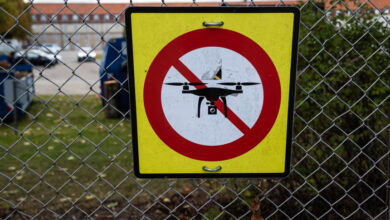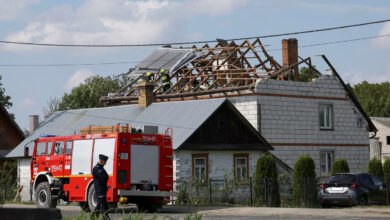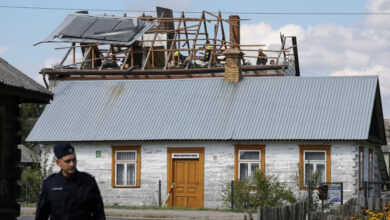Tripoli – "We are all happy when NATO bombs like that," the taxi driver said on Wednesday, the morning after the heaviest Western air strikes on the Libyan capital.
"Everyone here has rebel flags at home, just waiting for the day when the rebels finally reach the outskirts of the city, when we will pour out into the streets."
Muammar Qadhafi remains in firm control of Tripoli after crushing protests in February.
But NATO bombardment, fuel shortages, defections of top officials and slow but important rebel advances on the battlefield are tightening the noose around the Libyan leader.
Alone in their shops and cars, out of earshot of the feared secret police and their informants, Tripoli residents are about as likely to express support for the government as opposition.
Supporters are passionate, even in private. But it is the opponents who speak with more confidence about the future.
Dissent is still mostly furtive. In the Ben Ashour district, one man said police had interrogated every employee at a shopping center after activists planted a small rebel flag on top of it.
Pro-Qadhafi graffiti is sprayed throughout the city. But nearly as common, especially in outlying districts, are blotches where government supporters have painted over anti-government messages scrawled at night.
Pro-government graffiti is sometimes defaced, with the leader's name scribbled out in the common slogan "God, Muammar, Libya and that's all!"
In anti-government neighborhoods like Souq al-Juma in the city's east, residents say gunfire can be heard every night. Rebel supporters occasionally attack government checkpoints.
Three insurgents were killed in one such attack last week. Hundreds of angry men attended their funeral, waving rebel flags and chanting "Muammar is the enemy of God," in the biggest overt show of defiance since February, broken up by police gunfire.
Pro-government demonstrations are frequent and passionate but not well attended. When Qadhafi called the nation out onto the streets in a television address after Tuesday's bombing, at most a few hundred supporters appeared at a traffic circle waving his portrait, some firing rifles into the air.
SHORTAGES
For the most part, NATO's bombing has had little impact on everyday life in the city, which continued throughout hours of unrelenting strikes on Tuesday. Children were on the streets on bikes. Working-class cafes served up the formidable espressos and cappuccinos inherited from Italian occupation.
The air strikes have generally been confined to military bases and government buildings. The government has provided no evidence to support its assertions that there have been large numbers of civilian casualties.
Far more disruptive than the bombing itself have been the shortages, especially of fuel, resulting from international sanctions. Queues for petrol stretch for kilometers and last for days. Tempers can quickly flare.
At a petrol queue in the central Ben Ashour district, several witnesses said, police opened fire with rifles and a large-caliber anti-aircraft gun after a quarrel last week.
They said one elderly man was killed and an angry crowd poured into the street for a brief, spontaneous demonstration.
"What does it mean when people aren't afraid any more?" said an opposition activist in the district, referring to the demonstration. "When we used to hear gunshots, we were frightened. Now we are used to it."
The threat looms of food shortages. Most Libyans are fed by the state, which exported 1.8 million barrels of oil a day in peacetime and spent much of the returns on imports given out at heavily subsidized prices.
The oil exports have halted, and the United Nations humanitarian coordinator for Libya, Panos Moumtzis, said last week the Qadhafi government's supply of some foodstuffs could run out within weeks, with no prospect of replenishing imports.
Bread is still widely available at the heavily subsidized price of about 3 US cents a loaf, but many bakeries have closed and others have queues each morning.
A bakery worker selling loaves to shoppers queuing in western Tripoli said other bakeries had shut because their foreign workers had left, but he had faced no shortages so far.
The government has been hit by a stream of defections. Labor Minister al-Amin Manfur told delegates at a Geneva conference of the International Labor Organization on Tuesday that he was defecting.
Shokri Ghanem, a former prime minister and head of Libya's oil industry since 2006, defected last week. Qadhafi's government calls defectors cowards and says their actions will have no impact.
WAITING
For now, opponents of the government in the city are not yet ready to take to the streets en masse as they did before February's crackdown, the Ben Ashour activist said. The lack of Internet and text messaging makes it impossible to organize a demonstration, and people still fear the secret police.
Instead, they are waiting for the rebels.
The advance of anti-Qadhafi forces has been slow, but after weeks of stalemate they made important progress in the last week both to the west and east of the capital.
In the West, where rebels control mountains by the Tunisian border, they have advanced to Yafran, just 120km (80 miles) from the outskirts of the capital and less than 100km from the coast road that provides Tripoli's last link to the outside.
To the east, after breaking the government's siege of their beachhead in the third-largest city Misrata, the rebels pushed along the coast road toward Zlitan, the first of two big towns in their path before Tripoli's outskirts.
But on Wednesday troops loyal to Qadhafi advanced on Misrata, shelling it from three sides and killing at least 10 rebels, a rebel spokesman said.
"People are really just waiting…for the people from the mountains or the east to close in," said the activist in Ben Ashour. "You'd be surprised how many people here have Kalashnikovs."
Both sides speak of a looming showdown and say they are getting ready for battle. A taxi driver who supports the government waved a document which he said authorized him to carry a rifle to defend the state.
"Qadhafi will never be defeated. If the rebels come, I for one will go out into the streets to fight them," he said.
In Fashloum, one of the districts that rose up in February, two men repairing a pickup truck on a sandy lot say they plan to install a mount for a grenade launcher in the bed, so they can join fellow rebels who have been attacking checkpoints.
A shopkeeper at a nearby grocery store said most people in the area are against the government.
"Resistance is growing," he said. "They arrest us for doing nothing, so we might as well be doing something."
"We are not afraid. The barrier of fear has fallen."




